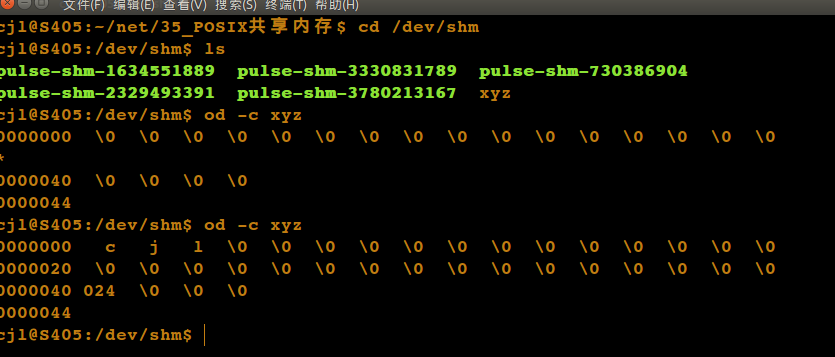POSIX共享内存不需要自己手动挂载,只要打开成功,就会自动挂载.一般挂载在 /dev/shm 目录下
cd /dev/shm
od -c xyz
1. shm_open 函数
功能:用来创建或打开一个共享内存对象
原型:
int shm_open(const char* name,int oflag,mode_t mode);
参数:
name:共享内存对象的名字
oflag:与open 函数类似,可以是O_RDONLY,O_RDWR,还可以按位或上O_CREAT,O_EXCL,O_TRUNC等.
mode:此参数总是需要设置,如果oflag没有指定 O_CREAT, 可以指定为0;
返回值: 成功返回非负整数文件描述符;失败返回-1
2. ftruncate
功能:修改共享内存对象大小
原型: int ftruncate(int fd,off_t length);
参数:
fd:文件描述符
length:长度
返回值: 成功返回0,失败返回-1
3.fstat
功能:获取共享内存对象信息
原型:
int fstat(int fd,struct stat *buf);
参数:
fd: 文件描述符
buf: 返回共享内存状态
返回值: 成功返回0,失败返回-1
4. shm_unlink函数
功能:删除一个共享内存对象
原型: int shm_unlink(const char* name);
参数:
name:共享内存对象的名字
返回值:
成功返回0,失败返回-1;
5.mmap
功能:将共享内存对象映射到进程地址空间.
原型:
void *mmap(void *addr,size_t len,int prot,int flags,int fd,off_t offset);
参数:
addr:要映射的起始地址,通常指定为NULL,让内核自动选择
len: 映射到进程地址空间的字节数
prot: 映射区保护方式
flags: 标志
fd: 文件描述符
offset: 从文件头开始的偏移量
返回值: 成功返回映射到的内存区的起始地址,失败返回-1
注意:
ERRORS
EACCES A file descriptor refers to a non-regular file. Or MAP_PRIVATE
was requested, but fd is not open for reading. Or MAP_SHARED
was requested and PROT_WRITE is set, but fd is not open in
read/write (O_RDWR) mode. Or PROT_WRITE is set, but the file is
append-only.
shm_open.c
#include <unistd.h>
#include <sys/types.h>
#include <sys/mman.h>
#include <sys/stat.h>
#include <fcntl.h>
#include <stdlib.h>
#include <stdio.h>
#include <errno.h>
#define ERR_EXIT(M) \
do \
{ \
perror(M); \
exit(EXIT_FAILURE); \
}while(0);
typedef struct stu
{
char name[32];
int age;
}STU;
int main(void)
{
int shmid;
//用来创建或打开一个共享内存对象
shmid = shm_open("/xyz",O_CREAT | O_RDWR,0666);
if(shmid == -1)
ERR_EXIT("shm_open err");
printf("shm_open success\n");
if( ftruncate(shmid,sizeof(STU)) == -1 ) //修改共享内存对象大小
ERR_EXIT("ftruncate");
struct stat buf;
if(fstat(shmid,&buf) == -1) /// get file status
ERR_EXIT("fstat err");
printf("size=%ld mode=%o\n",buf.st_size,buf.st_mode & 0777);
close(shmid); // 仅仅需要一个close就可以关闭
return 0;
}
shm_unlink.c
#include <unistd.h>
#include <sys/types.h>
#include <sys/mman.h>
#include <sys/stat.h>
#include <fcntl.h>
#include <stdlib.h>
#include <stdio.h>
#include <errno.h>
#define ERR_EXIT(M) \
do \
{ \
perror(M); \
exit(EXIT_FAILURE); \
}while(0);
int main(void)
{
shm_unlink("/xyz");
return 0;
}
shm_write.c
#include <unistd.h>
#include <sys/types.h>
#include <sys/mman.h>
#include <sys/stat.h>
#include <fcntl.h>
#include <string.h>
#include <stdlib.h>
#include <stdio.h>
#include <errno.h>
#define ERR_EXIT(M) \
do \
{ \
perror(M); \
exit(EXIT_FAILURE); \
}while(0);
typedef struct stu
{
char name[32];
int age;
}STU;
int main(void)
{
int shmid;
shmid = shm_open("/xyz",O_RDWR,0); // 这里必须是O_RDWR才能映射成功
if(shmid == -1)
ERR_EXIT("shm_open err");
printf("shm_open succ\n");
struct stat buf;
if(fstat(shmid,&buf) == -1)
ERR_EXIT("fstat err");
STU *p;
//将共享内存对象映射到进程地址空间.
p = mmap(NULL,buf.st_size,PROT_WRITE,MAP_SHARED,shmid,0);
if(p == MAP_FAILED)
ERR_EXIT("mmap err");
strcpy(p->name,"cjl"); // 根据映射的地址,写入数据
p->age = 20;
close(shmid); // 仅仅需要一个close就可以关闭
return 0;
}
shm_read.c
#include<stdio.h>
#include<stdlib.h>
#include<sys/ipc.h>
#include<sys/types.h>
#include<unistd.h>
#include<errno.h>
#include<fcntl.h>
#include<sys/stat.h>
#include<sys/mman.h>
#include<string.h>
#define ERR_EXIT(m) \
do { \
perror(m); \
exit(EXIT_FAILURE); \
} while(0)
typedef struct stu
{
char name[32];
int age;
} STU;
int main(void)
{
int shmid;
shmid = shm_open("/xyz", O_RDONLY, 0);
if (shmid == -1)
ERR_EXIT("shm_open");
struct stat buf;
if (fstat(shmid, &buf) == -1)
ERR_EXIT("fstat");
printf("size=%ld, mode=%o\n", buf.st_size, buf.st_mode & 0777);
STU *p;
p = (STU *)mmap(NULL, buf.st_size, PROT_READ, MAP_SHARED, shmid, 0);
if (p == MAP_FAILED)
ERR_EXIT("mmap");
printf("name=%s age=%d\n", p->name, p->age);
close(shmid);
return 0;
}
Makefile
.PHONY:clean all
CC=gcc
CFLAGS=-Wall -g
BIN=shm_open shm_unlink shm_write shm_read
all:$(BIN)
%.o:%.c
$(CC) $(CFLAGS) -c $< -o $@
shm_open:shm_open.o
$(CC) $(CFLAGS) $^ -o $@ -lrt
shm_unlink:shm_unlink.o
$(CC) $(CFLAGS) $^ -o $@ -lrt
shm_write:shm_write.o
$(CC) $(CFLAGS) $^ -o $@ -lrt
shm_read:shm_read.o
$(CC) $(CFLAGS) $^ -o $@ -lrt
clean:
rm -f *.o $(BIN)
